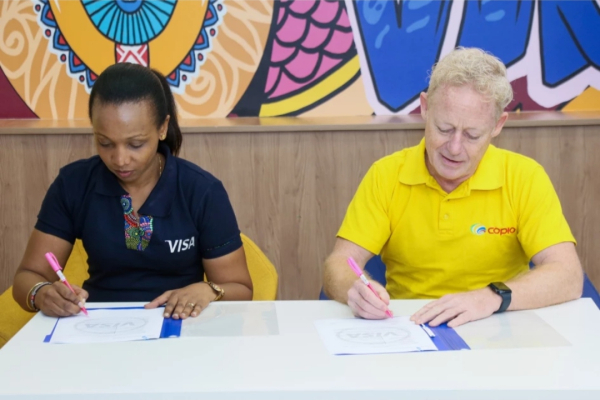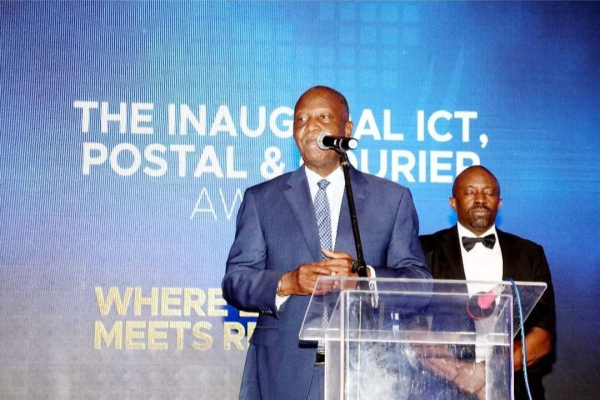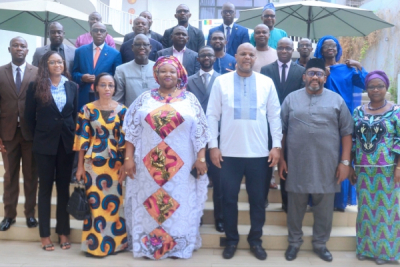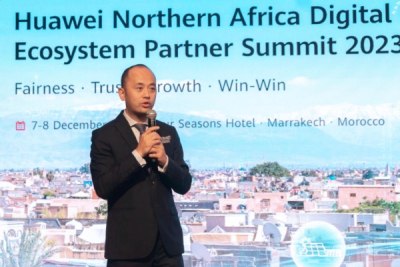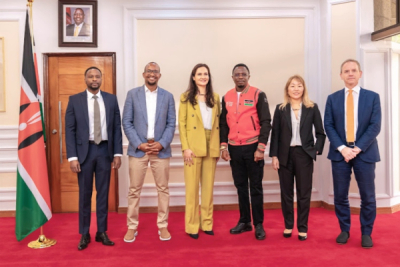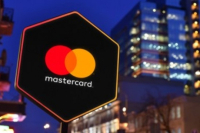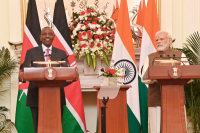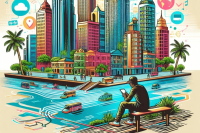
Tech (1153)
Following the closure of its Ugandan subsidiary in April 2023, Copia Global is now doubling down on its presence in Kenya. This strategic shift is marked by the announcement of a partnership with an American financial services giant.
Kenyan e-commerce platform Copia Global announced, on Tuesday, December 12, a 5-year partnership with American financial services giant Visa. This collaboration aims to facilitate commercial transactions on the platform and provide customers with access to a wider range of financial services.
This partnership empowers Copia's Kenyan customers to seamlessly buy and pay directly on the platform, save money through their e-wallet, access convenient borrowing options, and utilize deferred payment services. Additionally, members of the Kenyan diaspora can easily top up their loved ones' Copia e-wallets in just a few clicks via Visa.
"Copia’s network of customers, agents, and delivery sub-contractors will benefit from Visa’s capabilities on contactless payments, remittances, and loyalty solutions," said Eva Ngigi-Sarwari (photo, left), Visa Kenya Country Manager.
Founded in 2013 by Crispin Murira, Tracey Turner, and Jonathan Lewis, Copia Global has already secured over $100 million in funding to fuel its expansion. As of March 2023, the Kenyan e-commerce platform boasted a network of over 40,000 digital agents and nearly 2 million customers. Despite closing its Ugandan operations in April 2023, Copia Global continues to demonstrate consistent growth and solidify its position within the Kenyan market. This strategic partnership with Visa marks a significant step in this ongoing process, potentially paving the way for future investments in the world of financial technologies.
"The partnership and rapid digitization of customers creates a huge opportunity for Copia and Visa to bank the unbanked with previously inaccessible financial services, solving financial inclusion for the mass market in Africa," said Evelyn Wangari, Director of Financial Services at Copia Global.
Adoni Conrad Quenum
In a strategic move to accelerate its digital transformation, the Zambian government has embarked on an ambitious project to provide nationwide access to broadband internet. This initiative aims to empower citizens and unlock significant job creation opportunities through increased participation in the digital economy.
The Zambian government will phase out 2G technology entirely and shift focus towards 4th and 5th generation (4G and 5G) networks, Minister of Technology and Science, Felix Mutati, announced during the inaugural ICT, Post and Courier Awards on December 9th.
“We are eliminating 2G because we want all towers to be internet enabled. Every tower from now on will only be 4G and upwards internet enabled. We must use ICT as an enabler to deliver change to the people of Zambia,” he said.
Indeed, over the past two years, Zambia has stepped up initiatives aimed at creating a favorable environment for improving connectivity in the country. In June, an operating license was granted to Starlink, a subsidiary of the US company SpaceX, to provide satellite Internet services throughout the country, including areas previously considered inaccessible.
Telecom operators such as Airtel and MTN have also launched the commercialization of 5G in the country. Initially, the service was concentrated in specific areas, such as densely populated residential areas, shopping malls, hospitals, city centers, and central business districts.
All these initiatives have improved Internet access in the country. According to the Minister, Internet penetration has risen to 58% this year, compared with around 53% last year. The Post Office's business grew by 70% this year.
By focusing on 4G and 5G, Zambia aims to ensure greater digital access for the population, create jobs, and attract and retain investment in the ICT sector over the next few years.
Samira Njoya
Tourism is one of the key economic sectors for African countries. To this end, ECOWAS member countries have decided to digitize the sector.
On December 6, the Economic Community of West African States (ECOWAS) announced the development of a digital platform for classifying tourist accommodation establishments. This decision follows a meeting held in Dakar from November 21-24, 2023, attended by delegations from member countries.
The platform aims to simplify the process for tourists seeking accommodation throughout the West African region. According to Dr. Anthony Luka Elumelu, ECOWAS Director in charge of the private sector, this innovative measure enhances the value of ECOWAS tourism facilities by serving as an information hub for international and regional tourists.
It forms a key part of the Ecotour 19-29 ten-year action plan, designed to accelerate the development of the tourism sector across the sub-region. The adoption of Regulation C.REG.2/07/23 by the ECOWAS Council of Ministers in July 2023 and the subsequent creation of the Tourist Accommodation Standards Authority established standardized criteria for classifying accommodation establishments within the community, paving the way for the platform's implementation.
ECOWAS expects the platform to deliver significant benefits for public tourism administrations responsible for hotel classification. These include reduced costs and time associated with the classification process, eliminating the need for extensive travel to fulfill obligations, and providing real-time access to statistical data on both hotel supply across all member countries and tourist arrivals.
Adoni Conrad Quenum
Despite the urgency of the situation, the adoption of a strong global response to slowing climate change and minimizing its impact on human life across the planet is still hampered by political differences. However, amidst this global gridlock, some manufacturers are taking matters into their own hands and approaching the climate issue from other angles.
Morocco’s Marrakech hosted, from December 7 to 8, the Huawei Northern Africa Digital Power Ecosystem Partner Summit 2023, held under the theme "Lightening up a green Africa and closing the energy gap."
Over two days, some 180 strategic partners, industry leaders, experts from government agencies, and renewable energy associations discussed current energy challenges and renewable energy trends in Africa.
In his opening address, Philippe Wang (photo), President Digital Power and Executive Vice President of Huawei Northern Africa (North, West and Central Africa), said: "A new era is dawning in the energy industry: that of digital energy, closely linked to the digital world."
“This age is no longer determined by resource dependence, but by technology. Today, we are seizing the opportunities by integrating WatT, HeaT, BatTery and BitT (4T technologies) to shape a greener and more promising future for Africa," he added.
According to Huawei, despite possessing 7,900 GW of solar potential and receiving eight hours of sunshine daily, Africa still faces stark energy disparities. "While almost 100% of the population in North Africa had access to electricity in 2023, this proportion was only 56% in West Africa," says the Chinese technology group, which also showcased its technological innovations designed to accelerate the continent's energy transition and efficiency during the summit.
To respond to the urgency of the African transition, exacerbated by global warming, electricity shortages, energy instability and rising fossil fuel prices, Africa plans to increase its renewable energy capacity by more than 5 times. During COP 28 in Dubai, more than 20 African countries supported the global call to triple renewable energy capacity and double energy efficiency by 2030.
Recognizing the growing influence of social networks in fostering entrepreneurship, TikTok has launched a program specifically designed to empower entrepreneurs in sub-Saharan Africa.
Chinese tech giant TikTok, partnering with the non-profit Yunus Social Business (YSB), announced on Wednesday, December 6th, a $1.5 million investment in East African micro, small, and medium-sized enterprises (MSMEs). This initiative, focused primarily on Kenya, aims to equip MSMEs with the resources, particularly digital skills, necessary for growth and success.
Through the TikTokEmpower program, TikTok will establish training and mentorship programs covering crucial topics such as brand building, sales and e-commerce strategies, and leveraging digital platforms for business success.
"This #TikTokEmpower partnership with YSB represents a transformative opportunity to empower entrepreneurs, address social challenges and stimulate sustainable economic growth in Kenya and East Africa. We've seen the profound impact and real opportunity that TikTok brings to small businesses around the world, and we're proud to encourage this entrepreneurial spirit and digital innovation in Africa," said Fortune Mgwili-Sibanda, Director of Government Relations and Public Policy for Sub-Saharan Africa for TikTok.
Before opening its Kenyan office, the Chinese giant invested in William Ruto's country with its TikTokEmpower program. In August, the social network had come close to being banned in the country before its CEO Shou Zi Chew announced the opening of physical offices to oversee its activities in East Africa after a virtual meeting with the authorities. With this investment, TikTok is increasing its involvement on the African continent where it is, according to a September report by GeoPoll, the second most-used social network after Facebook.
Adoni Conrad Quenum
Digital transformation is a key pillar of President William Ruto's government, with efforts underway to digitize various sectors across the country. However, one crucial area remains untouched: the identification system. This has once again sparked resistance from the Kenyan population.
Maisha Namba, the digital identification system planned by the Kenyan government, will not see its anticipated launch this year due to a recent decision by the High Court of Kenya. The court has ordered a halt to the system's rollout, citing the absence of a data protection impact assessment.
The court's decision imposes a stay on the implementation or further progression of the government's November 1, 2023, resolution to deploy or pilot Maisha Namba, encompassing the digital card, unique personal identifier, and a national population register. This pause is mandated until a comprehensive data protection impact assessment is conducted, as stipulated in section 31 of the Data Protection Act, according to the High Court.
This legal development follows a petition filed by civil society groups, including the Katiba Institute, the Nubian Rights Forum, the Kenya Human Rights Commission, and the Coalition of Human Rights Defenders. The petitioners argue that the biometric and biographical data collected during registration were obtained unlawfully, and the government lacks a legal foundation for the digital identity system. Additionally, concerns are raised about data protection, the exclusion of many Kenyans from the system, and the expeditious rollout scheduled for this December.
This marks the second instance where the High Court has intervened to suspend the deployment of a digital identification system in the country. The previous system, Huduma Namba, initiated by former president Uhuru Kenyatta, faced similar criticisms and suspension on the same grounds.
The court emphasizes that any implementation of the system must await the completion of a data protection impact assessment, as outlined in Article 31. This article governs the collection, storage, use, and sharing of personal information, with a particular emphasis on safeguarding privacy and personal security.
Samira Njoya
Africa's burgeoning technology ecosystem is attracting investors from around the globe, with over $2.95 billion invested in the continent's startups within the first nine months of the year alone, according to the African Private Equity and Venture Capital Association.
On Monday, December 4, the MasterCard Foundation Africa Growth Fund, a $200 million impact-investment initiative of the MasterCard Foundation, announced a $27 million investment in three African investment companies dedicated to supporting early-stage startups. The investment aims to stimulate technological innovation and accelerate digital transformation across the continent.
Chui Ventures, VestedWorld, and SME Impact Fund are the three investment companies receiving the funding, with allocations of $9 million, $10 million, and $8 million, respectively. These companies are focused on identifying and nurturing high-potential startups in various sectors, primarily in Ghana, Nigeria, Kenya, and Tanzania.
"We are excited to welcome Chui Ventures, Vested World, and SME Impact Fund to our expanding family of investment vehicles. These strategic partnerships represent our ongoing commitment to fostering sustainable development in Africa through impactful investments. Stay tuned for more developments in the very near future," commented Samuel Akyianu, Managing Director of the MasterCard Foundation Africa Growth Fund.
The establishment of the Africa Growth Fund aligns with the MasterCard Foundation's broader efforts to drive digital transformation across Africa. This year alone, the fund has invested in several startup-focused investment companies, including Nigeria's Aruwa Capital Management ($2.2 million) and Uganda's Inua Capital ($5 million). Additionally, the foundation demonstrated its support for Uganda's national startup policy, which aims to enhance the attractiveness of the country's technological ecosystem.
Commenting on the MasterCard Foundation's investment, Joyce Ann Wainaina, Managing Director of Chui Ventures, stated, "This investment validates our effort to drive African innovation and entrepreneurship, and we are eager to unlock the potential of these promising ventures."
Adoni Conrad Quenum
India and the Republic of Kenya have maintained robust bilateral ties spanning various sectors since 1948. Recently, the two countries decided to step up their cooperation in the digital field.
Kenyan President William Ruto embarked on a three-day visit to India on Monday, December 4. The visit culminated in the signing of five memorandums of understanding (MoUs) spanning critical sectors, including technology, public digital infrastructure, defense, agriculture, energy, and healthcare.
Underscoring the importance of this strategic partnership, President Ruto remarked, "Kenya and India will expand partnership in technology along other sectors. We will benefit tremendously from India’s capacity and experience as a global leader in technology."
The digital agreement paves the way for India to facilitate the transfer of skills and technologies tailored to Kenya's specific needs, particularly in the areas of health, education, ICT, and digital governance. Additionally, the two countries' Heads of state explored avenues for Kenya to harness the potential of e-health by leveraging digitization and technology in telemedicine and telehealth initiatives.
India's burgeoning ICT sector has garnered global attention in recent years, prompting partnerships with numerous nations seeking to emulate its success. In Africa, aside from Kenya, countries like Sierra Leone, Nigeria, Egypt, Gabon, the Democratic Republic of Congo, and Mauritius have established partnerships with India to advance sectors such as artificial intelligence, telecommunications, and digital infrastructure.
The initiative aligns with President William Ruto's vision of harnessing digital technology to drive socio-economic development in Kenya. The country aspires to become a benchmark for digital transformation in Africa by 2027. This ambitious goal entails developing a cutting-edge digital infrastructure, expanding high-speed internet access nationwide, digitizing education and select government services, and enhancing the population's digital skills.
Samira Njoya
Digital transformation is rapidly gaining momentum across Africa, and The Gambia is actively embracing this shift, implementing initiatives to harness the transformative power of technology and reap the benefits of the digital economy
After nine months of collaboration with the United Nations Economic Commission for Africa (UNECA), The Gambia is preparing to launch a comprehensive "twin-pronged" digital strategy: one for transformation, the other for identification. This plan aims to propel the country into a new era of innovation, fostering economic growth, social inclusion, and government efficiency, as the UNECA says in a statement.
The strategy will be validated at a workshop to be held in the Gambia from Wednesday, December 19 to Thursday, December 20. Among other things, its digital transformation component envisions robust e-government services, streamlined administrative processes, and seamless interactions between citizens and the state. It also calls for the development of high-quality digital infrastructures and the empowerment of citizens in digital skills.
Meanwhile, the digital identification component calls for a standardized, interoperable system, seamlessly connecting citizens to a vast array of government and private sector services. It also defines the means that will be deployed to protect citizens' privacy, in line with best practices and international standards in digital identity management.
The comprehensive strategy is designed to tackle the digital divide, ensuring equitable access for all. According to studies carried out in the country, digital identification could contribute between 1% and 3% to real GDP in the years following its implementation.
Samira Njoya
Digital transformation is positively impacting key sectors of the economy, notably in Africa with sectors like agriculture and finance. To further capitalize on its opportunities, African countries are actively invested in initiatives such as innovation support schemes that aim to encourage innovation and entrepreneurship.
Last week, the Tanzanian and Moroccan governments launched a satellite-based system for the digital collection of agricultural harvest data. The launch took place at the Tanzanian Agricultural Research Institute's (TARI) Uyole center in Mbeya, Tanzania.
The new system, which costs more than a billion Tanzanian shillings (around $399,202), should enable better estimates of agricultural yields and cultivated areas.
The system works by using smartphones equipped with satellite connectivity to collect data from "white zones," which are areas with limited or no internet access. These zones are home to most of Tanzania's agricultural regions.
The data collected by the smartphones will be used to monitor crops from germination to harvest. This will allow the Tanzanian government to have more accurate statistics on agricultural production.
"The aim is to have actual statistics of what we produce in every farming season," explained Fredrick Mlowe, a soil expert at the TARI center in Uyole. "Our officers used to predict the amount of crops to be harvested, a practice that is now phasing out as we are switching to digitalization,” headded
Tanzania is hoping that the new system will help to make agriculture a key sector for its economic development. In the age of the technological revolution, digitization is seen as a mandatory step for improving agricultural statistics. This, in turn, will enable the government to have a clearer vision of food security, monitor crop prices, identify production basins, provide financial support to farmers, and anticipate food shortages.
Adoni Conrad Quenum
More...
As the digital revolution sweeps across every field, new technologies are emerging to revolutionize the way people work. In the agriculture sector, one of the promising technologies is artificial intelligence, which is poised to greatly transform the sector by for instance helping optimize resource usage and minimize waste.
On Friday, December 1st, British pharmaceutical giant AstraZeneca announced a reforestation initiative in Kenya. Unveiled during COP28 in Dubai, the project aims to plant six million trees and leverage the power of artificial intelligence to monitor their growth and health.
Kenya's Rift Valley will be the heart of this initiative, spanning six counties and encompassing over 3,500 hectares of land. Experts will utilize a deep learning AI model to analyze drone and satellite imagery, tracking each tree's progress and quantifying carbon sequestration levels.
"Investing in our natural world through tree planting and conservation, and limiting deforestation, are some of the most effective preventative health steps we can take. By expanding AZ Forest to Kenya, we are progressing our commitment to deliver reforestation at scale, with a science-led approach that benefits both the environment and local communities," said Juliette White, AstraZeneca Vice President of Global Sustainability.
This initiative forms part of AstraZeneca's global "AZ Forest" program, launched in 2020 to plant and nurture 200 million trees –in partnership with landscape restoration specialists– across six continents by 2030.
Beyond Kenya, "AZ Forest" has planted nearly 3 million trees in Ghana this year alone, bringing their total to over 4 million since 2021. Rwanda is next in line, with a target of 5.8 million trees on 21,000 hectares in the coming months.
Samira Njoya
The African continent is undergoing a profound transformation of both its public services and its economy, driven by the rapid adoption of ICT. However, harnessing the full potential of these cutting-edge technologies requires the expertise and guidance of well-informed professionals.
Russia plans to enhance its ICT collaboration with African countries. As part of this effort, leading figures from some 36 African nations have been invited to Moscow this month to connect with Russian tech specialists and investors.
The initiative, spearheaded by Katerina Vladimirovna Tikhonova (pictured above), daughter of the Russian President, aims to support Africa's development of digital governance services, including cybersecurity, digitization of public services, and electronic voting. The initiative is being driven through a center affiliated with the Russian Foundation for Intellectual Development.
This effort falls under an awareness-raising project titled "e-Governance Knowledge Sharing Program," which was launched in July by the foundation in partnership with the Moscow Higher School of Economics.
Through this initiative, participating African countries will gain access to Russia's advanced expertise in providing digital services to citizens. According to international experts, Russia ranks among the most advanced countries in the digitization of public services. The country is ranked 42nd in this area out of 193 countries by the UN.
In terms of e-voting, Russia is currently testing a digital platform that will be used for the presidential election in 2024. This presents an opportunity for African countries to familiarize themselves with this innovation, which is still gaining traction on the continent. As a result of this working visit and the ensuing partnerships, African countries will also enhance their cybersecurity capabilities. Notably, in the wake of the conflict between Russia and Ukraine, the country has been actively developing solutions to strengthen its cyberspace.
Samira Njoya
To ensure the success of its digital transition program, Algeria needs a skilled workforce. For that purpose, the government wants to implement programs to match students’ skills to the demands of the job market.
The Algerian Ministry of Higher Education and Scientific Research has inked a partnership agreement with Huawei, a global leader in ICT equipment and infrastructure. The agreement, signed on November 28, 2023, aims to equip universities and colleges with cutting-edge technology while bolstering the digital skills of students and faculty. According to local media outlet Agence algérienne de presse, it was initialled by the Ministry's Secretary General, Abdelhakim Bentellis, and Huawei Algeria Vice President Alex Zhang Chang
Under the terms of the agreement, Huawei will provide six universities with state-of-the-art smart classrooms, enabling students to access world-class educational programs. Additionally, the company will collaborate with the Ministry to develop comprehensive training programs for teachers and students, focusing on in-demand digital skills such as artificial intelligence and cloud computing.
This strategic partnership aligns with the Ministry's vision of modernizing Algeria's higher education system and ensuring that students are equipped with the skills necessary to thrive in the digital era. The initiative builds upon the recent launch of 46 digital platforms designed to enhance the digital literacy of students and teachers, demonstrating the government's unwavering commitment to transforming the education sector.
Samira Njoya
Kenya is making significant strides to solidify its position as the preeminent technology hub in East Africa. To achieve this ambitious goal, the country is forging strategic partnerships with key technical partners.
Kenya launched the Green and Digital Innovation Hub Kenya (gDIH) on Tuesday, November 28, during Kenya Innovation Week. The initiative, spearheaded by the Digital Transformation Centre of the German International Development Cooperation Agency (GIZ) in Kenya, aims to empower micro, small, and medium-sized enterprises (MSMEs) with the necessary technology and innovation resources to navigate the digital transformation journey and enhance their participation in the country's digital economy while adhering to green principles.
"As the digital economy evolves and competition becomes more intense, the hub stands as a distinctive platform for MSMEs to level the playing field, ensuring equitable access to digital innovation opportunities for all MSMEs in Kenya, irrespective of their geographical location," emphasized Bernd Lakemeier, GIZ Kenya’s Director of Programs Sustainable Economic Development Cluster.
The hub's activities will focus on fostering innovation in the agriculture, information and communication technology, and energy sectors, leveraging cutting-edge technologies such as artificial intelligence, the Internet of Things, cybersecurity/IT security, cloud computing, and smart cities. The promoters envision the gDIH becoming a major technology hub in the country, further strengthening Kenya's already robust technology landscape on a continental scale.
Commenting on the launch of gDIH, Prof. Tom Ogada, the Team Lead of the ACTS consortium said: “Embedding a green ethos into technological advancements holds substantial implications for Kenya’s sustainable development and economic growth. By fostering collaborations with diverse stakeholders and organizations, we are committed to extending the Hub’s influence beyond Nairobi to encompass all 47 counties, facilitating linkages to expertise, markets, and access to capital beyond the borders of our nation.”
Adoni Conrad Quenum


